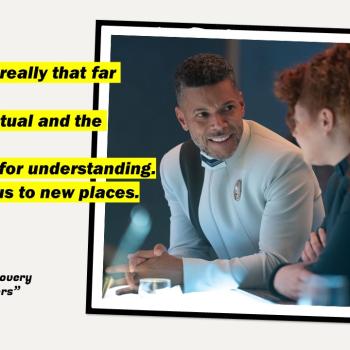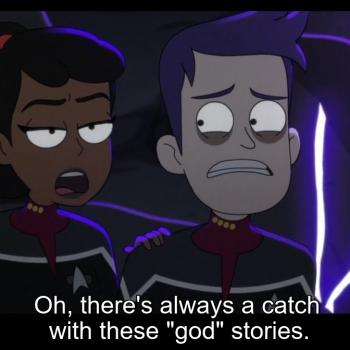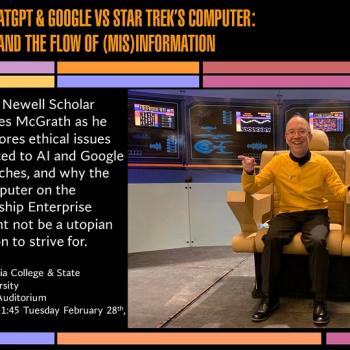I can see why the discussion arose about whether one can mention God on Star Trek. When they seem to be lost on a desert world, Michael Burnham (Number One) says “Ye of little faith.” And discovering a Klingon beacon, Commander Burnham talks about sculpture as “sacred.” Such elements, voiced by someone who was raised in a Vulcan environment, are fully in keeping with the original series’ willingness to make room for Vulcan spirituality and the occasional passing reference to Christianity. This also provides an answer to a question someone asked recently: in the future that Star Trek depicts, the liberal arts are alive and well. Adherence to religion may be less widepread or perhaps just less outwardly visible, but people continue to study it, at the very least.
Here are some other thoughts about the new series, which occurred to me as I watched it:
When T’Kuvma speaks of a Klingon crusade for self-preservation, that sounds so very unlike the Klingons of TNG to me. But there is also mention of Klingon terror raids, suggesting that we are seeing a time before TOS, when the Klingon ethos related to battle does not yet have the for, that it would soon come to take in every aspect.
The Klingons talk of prophecy, doubt towards “fables” and whether other Klingons will respond to a fall based on them, and being worthy not by blood but by faith. All of that is obviously of interest from the perspective of religious studies, and merits further exploration.
Burnham tells a StarFleet admiral that it would be a mistake to confuse culture with race. It raises the question of whether making assumptions based on culture is fundamentally different.
Sarek says, “How rare to encounter one’s demons in the flesh.” Burnham’s parents were killed by Klingons.
The first episode ends with numerous Klingon ships coming out of warp in response to the beacon. The second picks up there, indicating that there are 24 vessels, corresponding to 24 houses of the Klingon empire, suggesting that someone is trying to unify that empire against StarFleet. This seems an odd idea – can it be an empire and yet in such disarray? The Klingon who calls them to unity, T’Kuvma, says that their purity is a threat to their federation, Their slogan is “Remain Klingon.” The Klingons then attack the Federation ships (reinforcements had arrived by this point).
There had been speculation prior to these episodes airing about whether Michael Burnham is transgender, but we learn in the second episode that the captain uses female pronouns in referencing the First Officer.
As Michael is in the brig, she has a vision of Sarek, who says that his katra (the Vulcan concept equivalent to our idea of a “soul”) is still connected to hers.
The admiral makes an offer of a cease fire from aboard the Europa. But T’Kuvma uses a cloaked ship to destroy the Europa. T’Kuvma claims to be Kahless reborn. Michael describes him as having declared himself the next Klingon messiah. T’Kuvma shows concern to reclaim the slain floating in space and entomb them with his own hands.
The captain quotes Sun Tzu at one point, and they later use the fact tbat tbe Klingons are claiming their dead to get a photon torpedo onto the Klingon ship and damage it. They beam aboard to try to take T’Kuvma captive rather than making him a martyr. But in the fighting he is killed, as is the captain. The episode ends with Michael Burnham sentenced to life in prison, stripped of rank.
For a fuller summary of the two first episodes, see the post on IO9.
What did you think of Star Trek: Discovery? Given the high standard to which I hold Star Trek, I found it on the whole enjoyable and promising. In many ways, I think that honest fans will agree that it is better than some aspects of the original series, which was not consistently great although it had very many truly exceptional moments. And so I am looking forward to more episodes, which promise to have elements of J. J. Abrams’ version of the franchise (complete with lens flares), but with much more focus on principles of StarFleet, character interaction, and long-term plot development than the cinematic framework can afford.












